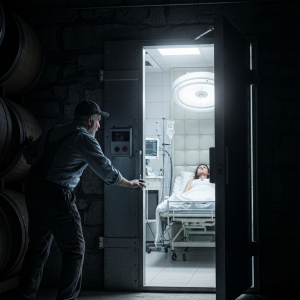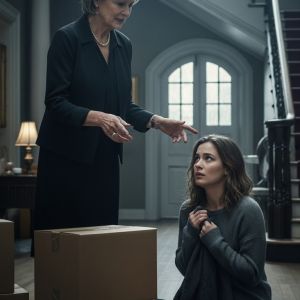When I was seventeen, I came home to a house silent as a tomb. On the kitchen counter, where the fruit bowl used to be, sat a single sheet of paper. The note was the cruelest thing I’ve ever read, not for what it said, but for what it didn’t. Four words scrawled in my mother’s handwriting: “You’ll figure it out.”
I didn’t know what I’d done wrong. For a wild, stupid moment, I thought it was a prank. But their clothes were gone. The family photos were missing from the walls. They were just… gone. I later learned from our landlord they’d moved two states away. He gave me a week to clear out my things. They had, of course, canceled the lease.
My family had never pretended to love me, not really. Love was a transaction, and my currency was usefulness. At thirteen, I baked a birthday cake for my mom, only for her to call it “clumpy.” At fifteen, I tutored my brother, Michael, through his final exams; he called me a know-it-all and slammed his door in my face. At sixteen, I handed my entire paycheck from the diner to my dad for bills, only to be screamed at weeks later for being a “useless freeloader.” I was always useful, but never cherished.
The first few nights, I crashed on a friend’s couch. Then another. But you can’t surf couches forever. Soon, home was a 5×10 storage unit, paid for with the last of my savings. I’d sneak into the YMCA at dawn to shower, my stomach aching from a diet of peanut butter eaten with a plastic spoon. I spent my days at the public library, using the free computers to apply for jobs, pretending to the world that everything was fine.
My break came in the form of a gruff diner manager who hired me for the night shift, paying me cash under the table until I could get a new ID. She once found me asleep in the break room, my head on a stack of napkins, and instead of firing me, she just covered me with her coat and let me sleep for an hour. She never mentioned it. That single act of kindness felt like a lifeline.
I clawed my way up. I bought a prepaid phone, saved every receipt, and devoured YouTube tutorials on personal finance. The first year was about survival. The turning point was a regular at the diner, a small business owner who offered me a temp job organizing his office files. It paid triple my server wages. That temp job led to another, and then a permanent position. I learned fast, stayed late, and never stopped asking questions.
By twenty-five, I launched my own consulting business from a folding table in a tiny apartment. By twenty-seven, I had five contractors and a real office. By twenty-nine, I was a millionaire. Not an Instagram-influencer millionaire, but an actual, seven-figure-net-worth, zero-debt, paid-off-apartment millionaire. The first time I saw the number in my banking app, I sank to the floor and sobbed.
For twelve years, there was only silence from them. I saw Michael on a “suggested friends” list once. He was married, with a kid on the way. I wondered if he ever told his wife about me. Did he say I ran away? Or did he say nothing at all?
The silence broke last week. I did a podcast interview about surviving family estrangement, and it went viral. My inbox was a flood of support from strangers. And then, an email with the subject line: “You’re still our daughter.” It was from my mom. No apology. Just a clinical paragraph about hearing “my side” and suggesting we talk. Then came one from Michael: “We miss you. Can we fix this?”
I stared at the messages for an hour before snapping my laptop shut. Healing, I wondered, did it mean looking back, or only ever looking forward?
My therapist, Melissa, advised me to wait. “Give yourself space to feel whatever comes up, Emma,” she said. “There is no rush.”
Ten days later, I replied to my brother. Just five words: “It’s been 12 years. What changed?”
His response was immediate. The podcast, he said, made him realize things. He claimed he was only fifteen, that he had no choice, that he’d always wondered about me. He said seeing me so successful made him proud. I didn’t buy it.
“So you were too afraid to reach out when I was homeless, but you’re proud now that I’m successful?” I typed back. “Is that it?”
His next email was a novel of excuses. His wife, Jenny, was pregnant with their second child. His business was struggling. Medical bills were piling up. There it was. The real reason.
Then my mother followed up, attaching old photos—me as a baby, us at the beach, a snowman in the yard. Happy moments from a life that felt like it belonged to someone else. At the bottom, she wrote, “We made mistakes. We are ready to make amends.” It was a statement, not an apology.
I agreed to meet Michael. Just him. A coffee shop in Chicago, a neutral city between us. He looked older, heavier, but his eyes were the same. The first twenty minutes were excruciatingly polite. Then, the performance began.
“Emma, I’m so sorry,” he said, his voice cracking on cue. “I was just a kid. They told me you wanted to stay behind, that you were going to live with a friend’s family.”
“And you believed that?” I asked, my voice flat. “For twelve years, you never once picked up a phone to see if the friend’s family was real?”
The question that had haunted me for over a decade finally spilled out. “Why me? Why was I the one you left behind?”
He looked down, stirring his cold coffee. “They… they always saw you as the strong one. The independent one. They convinced themselves you’d be better off.”
I almost laughed. “Better off? Michael, I was sleeping in a storage unit. I was showering at the YMCA. I ate peanut butter for dinner for three months straight.”
His face crumbled. He seemed genuinely remorseful, but he still hadn’t taken any real responsibility. He was a victim in his own story. He hugged me when we left. I stood perfectly still, my arms locked at my sides.
That night, my mother called. Michael must have given her my number. Her voice was syrupy with false pride. I cut through it. “Why did you leave me?”
Her answer was different from Michael’s, and infinitely more chilling. “We were in debt, Emma. We couldn’t afford you. We knew you were smart. We figured you’d go to social services, get placed with a better family. We honestly thought we were doing you a favor.”
I hung up and blocked her number. The next morning, an email from my dad arrived. It was a ledger of their hardships—failed businesses, medical bills, a looming eviction. At the very end: “We were wondering if you could help the family out.”
Not a single question about my life.
My decision was made. I emailed Michael, stating I was willing to have a relationship with him and his family, but under one condition: no financial support of any kind for our parents, and no contact with them until they took full, unequivocal responsibility.
His response was a dagger. “I’m really disappointed, Emma. Family is supposed to support each other. You’re being selfish.” All the old guilt buttons were pushed.
I didn’t respond. Instead, I booked a trip to Bali. I needed to breathe. But the situation escalated. My parents drove eight hours and showed up at my apartment building. They pounded on my door, their voices echoing in the hall. “Emma, please! We love you! We’re sorry!” I sat on the floor, back against the door, shaking. I called security and told them not to let my parents up again.
The next day, my doorman called. A woman was downstairs claiming to be my mother, having chest pains. I told him to call an ambulance but that I wasn’t coming down. At the airport, Michael called, sobbing. “Mom had a heart attack. This is your fault.”
I hung up and called Melissa. “Emma, you are not responsible for your mother’s health,” she said firmly. “This is a classic manipulation tactic.”
I went on my trip, but the guilt gnawed at me. When I returned, flowers were at my door. “Please call us. We’re staying at the Holiday Inn.” I threw them in the trash.
The true breakthrough came from an unexpected source. My doorman called again. A young woman was downstairs with a small child. She claimed to be my sister-in-law, Jenny. I was wary but told him to send her up.
Jenny looked exhausted, a sleeping toddler on her shoulder. “I came alone,” she said softly. “I only learned the real story three years ago, after your podcast. Michael told me you ran away.” She sat at my table, her eyes filled with a sincerity I hadn’t seen in anyone from that family.
“I’m so horrified by what they did,” she continued. “And I need you to know the whole truth.” She pulled out her phone. “They’ve been telling everyone for years that you abandoned them. That you stole money and were mentally unstable.”
She showed me years of public Facebook posts. My mother asking for prayers to find her “troubled daughter.” My dad claiming I’d taken their savings. A carefully constructed narrative of victimhood, all dated years after they had left me. My stomach dropped. It was a web of lies so intricate, so malicious, it stole my breath.
“They are desperate because your podcast is making people ask questions,” Jenny explained. “I confronted them, and they admitted it all. Michael kicked them out of our house after your dad… he grabbed my arm.” She pulled up her sleeve, revealing a faint, yellowing bruise.
Her daughter, Lily, woke up. “I want my children to know their aunt,” Jenny said, her voice thick with emotion. “But only if you want that. No pressure. No guilt. Just an open door.”
After they left, I forwarded my father’s next email—a threat to sue me for defamation—to my lawyer, Marcus. The next day, Michael called, panicked, from Jenny’s phone. His parents were furious with Jenny, and he was terrified they would do something desperate.
We met the next day, with my lawyer present. The story that spilled out was one of lifelong control and financial abuse. My parents had co-signed their mortgage and were still on Michael’s bank account. They had keys. They were leeches, and now that their hosts were fighting back, they were becoming dangerous.
That night, they broke into Michael and Jenny’s house, stealing documents and photos, leaving a note: “Family matters should stay in the family.”
That’s when I told them to come stay with me. My secure building was the only safe place. It was surreal. My apartment, once a symbol of my solitary success, was now a sanctuary for the brother who’d watched me be abandoned and the woman who had helped set me free.
The court date for the restraining order was set. The night before, I received an email from my mother: “If you go to court tomorrow, you’ll regret it for the rest of your life.”
In the courtroom, they looked small and pathetic. The judge listened to our evidence—the break-in, the threats, the long history of manipulation. He granted the restraining order. Three years. No contact. As we left, my mom called my name, her voice soft and pleading. I didn’t look back.
But as we walked to our cars, my phone buzzed. A text from an unknown number. It was a photo of Lily, playing at her friend’s house, clearly taken from a distance. Below it, four words: “This isn’t over yet.”
Fear turned to cold fury. I was done running. Done hiding. I emailed my parents. “Let’s talk. One last time. Tomorrow, noon. The coffee shop on 8th Street. Just me. After that, you leave us alone forever.”
I didn’t tell anyone. I sat in the back of the coffee shop, calm and centered. When they sat down, I spoke first, my voice even and cold.
“This isn’t a negotiation. It’s a notification. It’s over. You’ve lost. You’ve lost me, you’ve lost Michael, and you’ve lost your grandchildren.” I slid my phone across the table, showing them a screen full of their threats. “I have sent copies of these to a lawyer with instructions. If you contact any of us again—in any way—he will distribute them to every friend, neighbor, and church member you have. I will not just ruin your reputation; I will scorch the earth of your entire life. Do you understand?”
My father began to bluster about gratitude. I laughed in his face. “Gratitude? For abandoning your child? You are owed nothing.”
As I stood to leave, my mother whispered, “Do you really hate us that much?”
I paused at the door and looked back at them, two broken people who had tried to break me. “I don’t hate you,” I said. “I feel nothing for you. You’re strangers to me now. And that is your loss, not mine.”
Walking out of that coffee shop, I felt a weight I’d carried for twelve years finally lift.
Six months later, a letter arrived, forwarded by my lawyer. It was from my mother. It wasn’t an excuse or a demand. It was a short, terse acknowledgment of their failure as parents and a promise to respect the restraining order.
I keep it in a drawer. Not as a sign of forgiveness, but as a receipt. Proof of a boundary finally, painfully, drawn.
Last week was Lily’s fourth birthday. We held it at my apartment. My quiet, sterile home was filled with balloons, laughter, and the squeals of a happy child in a princess dress. Michael grilled on the balcony. Jenny was taking pictures. I stood in the kitchen doorway, watching this beautiful, chaotic scene. This new family. The family I had chosen. The family I had built.
I thought about that note on the counter all those years ago. You’ll figure it out.
And I did.




